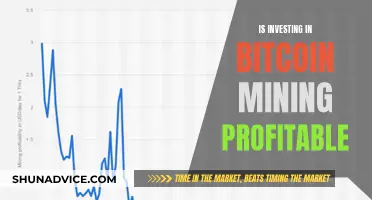
Investing in Bitcoin has become increasingly accessible, with a number of apps allowing users to invest as little as $1. While it is possible to invest such a small amount, it is important to consider the volatility of the cryptocurrency market and the associated risks. Bitcoin's value comes from its finite supply, and its price can fluctuate dramatically. For example, in April 2021, Bitcoin's price was $59,822.90, while five years prior, in April 2016, it was $426.84. As such, investing even a small amount in Bitcoin can yield significant returns, but it is also possible to lose money.
| Characteristics | Values |
|---|---|
| Minimum investment | $1 |
| Volatility | High |
| Historical performance | 14,000% growth between April 2016 and April 2021 |
| Risk | High |
| Profitability | Depends on market conditions |
| Accessibility | Available on apps and exchanges |
| Payment methods | Debit card, bank account, credit card |
| Taxes | Liable to pay capital gains tax |
What You'll Learn
- Apps like Venmo and WeBull allow you to invest as little as $1 in Bitcoin
- Bitcoin's value comes from its finite supply, store of value, and payment system
- You can buy Bitcoin using a debit card, bank account, or credit card
- Bitcoin is extremely volatile, so investors need to keep a close eye on their profits
- Only use money you can afford to lose when investing in Bitcoin

Apps like Venmo and WeBull allow you to invest as little as $1 in Bitcoin
Investing in Bitcoin can be done through a regulated exchange, a brokerage, or a peer-to-peer cryptocurrency exchange. Apps like Venmo and WeBull allow you to invest as little as $1 in Bitcoin. These apps provide a simple and accessible way to explore the world of cryptocurrency. With Venmo, you can buy Bitcoin, Ethereum, Litecoin, or Bitcoin Cash and track their value changes. On the other hand, WeBull offers a platform to trade not just Bitcoin but also Dogecoin, Bitcoin Cash, Ethereum, Ethereum Classic, Litecoin, ZEC, and XLM.
When investing in Bitcoin, it is important to consider the different types of cryptocurrency exchanges and brokers available. Centralized exchanges, such as Coinbase, Kraken, Gemini, and Binance, offer a wide range of cryptocurrencies and are ideal for those seeking a user-friendly interface. Decentralized exchanges, like Uniswap, provide more direct connections between users but may require more technical knowledge. Additionally, some traditional brokerages, such as Fidelity and Interactive Brokers, now offer crypto investing alongside other investment options.
It is worth noting that investing in crypto carries risks, and it is important to understand these risks before investing. Crypto assets do not have the same protections as equities or cash in a bank. It is recommended to use reputable exchanges or brokers and to familiarize yourself with crypto security measures.
When choosing a crypto trading platform, consider factors such as security, the variety of cryptocurrencies offered, fees, transaction options, customer support, and ease of use. Additionally, some platforms offer features like crypto staking and interest-earning options, but it is important to understand the risks and regulations associated with these products.
Easy Ways to Earn 1 Bitcoin Daily Without Investment
You may want to see also

Bitcoin's value comes from its finite supply, store of value, and payment system
Investing even a small amount of money in Bitcoin can be a good way to dip your toes into the world of cryptocurrency while limiting your risks. Apps like Venmo and WeBull allow you to invest as little as $1 in Bitcoin and other cryptocurrencies. However, it's important to remember that crypto is volatile, so it's crucial to proceed at a pace you're comfortable with.
Now, let's delve into the factors that contribute to Bitcoin's value: its finite supply, store of value, and payment system.
Bitcoin's finite supply is a key feature that sets it apart from traditional currencies. Unlike fiat currencies, which can be printed in infinite quantities by governments, Bitcoin has a limited supply of 21 million coins. This scarcity is a fundamental principle in classical economics, where the concept is simple: when a resource is limited, its perceived value increases. This idea is deeply rooted in the minds of investors and consumers, influencing their behaviours and driving market dynamics.
Additionally, Bitcoin serves as a store of value. It can function as a unit of exchange and has the same attributes as a fiat currency system. Bitcoin is highly divisible, much more so than fiat currencies. One Bitcoin can be divided into up to eight decimal places, with the smallest unit called a satoshi. This divisibility makes it possible to price goods and services accurately, enhancing its utility as a medium of exchange.
Finally, Bitcoin's value is also derived from its payment system. It can be used across borders, allowing anyone with an internet connection to participate in the global economy and access financial services. This accessibility and ease of use contribute to its value as a payment system.
In conclusion, Bitcoin's value stems from its finite supply, which increases its perceived worth; its ability to serve as a store of value and a unit of exchange; and its global accessibility as a payment system. These factors, combined with its decentralised nature and increasing adoption, have propelled Bitcoin to the forefront of the cryptocurrency world and continue to shape its value and potential as a revolutionary financial asset.
Harvard Minds: A Guide to Bitcoin Investment
You may want to see also

You can buy Bitcoin using a debit card, bank account, or credit card
Investing in Bitcoin can be a risky but rewarding endeavour. While it is possible to invest as little as $1 in Bitcoin, the amount of profit you make will depend on various factors, including the performance of the cryptocurrency market and the length of your investment.
If you're interested in purchasing Bitcoin, you can do so using a debit card, bank account, or credit card. Here's a step-by-step guide on how to get started:
Step 1: Choose a Crypto Exchange
First, you'll need to select a cryptocurrency exchange that allows you to buy Bitcoin. Popular options include Coinbase, Kraken, Gemini, and Binance. These exchanges offer different features and cryptocurrencies for trading, so be sure to compare them before making a decision.
Step 2: Create an Account and Verify Your Identity
Once you've chosen an exchange, create an account by providing your personal information and verifying your identity. This process may vary depending on the exchange, but it typically involves submitting documents such as a driver's license or passport.
Step 3: Connect a Payment Method
After your account is set up, it's time to connect your payment method. You can choose to use a debit card, bank account, or credit card. Keep in mind that some exchanges may charge additional fees for using certain payment methods, and credit card issuers may treat Bitcoin purchases as cash advances with associated fees and interest rates.
Step 4: Make Your Purchase
With your payment method connected, you can now buy Bitcoin. Decide how much you want to invest, keeping in mind that the value of Bitcoin can fluctuate. Review the available offers from different providers and choose the one that suits your needs.
Step 5: Store Your Bitcoin in a Wallet
Once you've made your purchase, you'll need to store your Bitcoin in a secure wallet. You can use an online or "hot" wallet, which is convenient for small amounts or active trading, or a "cold" wallet, which is a hardware device that stores your Bitcoin offline and is considered more secure.
Example Exchanges and Platforms
- Coinbase: A popular exchange that offers a wide range of cryptocurrencies and requires a minimum investment of $1.
- PayPal: Allows you to buy Bitcoin directly or through third-party providers using your PayPal balance, a connected bank account, or a debit card.
- Changelly: A crypto exchange that supports purchases with credit or debit cards, Apple Pay, Google Pay, and bank transfers.
- BitPay: A platform that enables you to buy crypto with a credit card, debit card, Apple Pay, or Google Pay.
- Venmo: A peer-to-peer app owned by PayPal that lets you explore crypto "the Venmo way."
Remember, investing in Bitcoin comes with risks, and the value of your investment may go up or down. Always do your research, understand the fees involved, and only invest what you can afford to lose.
Strategizing Your Bitcoin Investment: A Guide to $100
You may want to see also

Bitcoin is extremely volatile, so investors need to keep a close eye on their profits
Investing in Bitcoin doesn't require a large sum of money. Many apps and services allow users to invest as little as $1. For example, Venmo, WeBull, and Coinbase all have low minimum investment requirements.
However, investing in Bitcoin is not without risk. Bitcoin is extremely volatile, and investors need to keep a close eye on their profits. Volatility is a measure of how much the price of a financial asset varies over time. It is synonymous with "risk" in traditional finance, with higher volatility corresponding to higher actual or perceived risk.
Bitcoin's volatility is driven by speculation and bets from investors, which cause sudden increases or decreases in its price. While Bitcoin's volatility has been declining and is expected to continue doing so, it is still a risky asset to hold. Its value can go up or down substantially in a short period, and investors need to be prepared for potential losses as well as gains.
Additionally, investors should be aware of the fees associated with buying and selling Bitcoin. These fees can vary depending on the exchange and payment method used. For example, credit card processing fees and interest charges can add to the overall cost of purchasing Bitcoin.
To minimize risk, investors should consider using a secure digital wallet outside their exchange account and enabling two-factor authentication. Cold wallets, or hardware wallets, are considered the most secure way to store Bitcoin as they are not connected to the internet and are therefore less likely to be compromised.
In summary, while it is possible to invest in Bitcoin with a small amount of money, it is essential to remember that Bitcoin is a volatile asset. Investors need to carefully consider the risks and take the necessary steps to protect their investments.
Governments' Bitcoin Investment: Why and How Much?
You may want to see also

Only use money you can afford to lose when investing in Bitcoin
Investing in Bitcoin and other cryptocurrencies is becoming increasingly popular and accessible. With a range of apps and services available, you can start investing in Bitcoin with as little as $1. However, it is important to remember the saying, "only invest what you can afford to lose".
This saying is often interpreted as not spending or investing money that you don't have. In other words, don't invest money that you don't currently have in hand, such as future paychecks or credit. It's important to ensure that your basic needs and financial obligations are met before investing. Additionally, investing should not be done with money that would cause emotional or financial distress if lost.
Another interpretation of this saying is to avoid investing money that you cannot afford to tie up for a long period. Bitcoin and other cryptocurrencies are highly volatile and can fluctuate significantly in value. There is no guarantee of quick profits, and the value of your investment may drop and remain low for months or even years. Therefore, it is crucial to only invest money that you can afford to be without for an extended period.
Furthermore, while Bitcoin has certain advantages, such as resistance to wild inflation due to its decentralized nature, it also carries unique risks. For example, Bitcoin wallets and exchange accounts can be compromised, leading to potential losses. Additionally, unlike traditional investments, Bitcoin and cryptocurrency investments are not protected by insurance from the Securities Investor Protection Corporation (SIPC). While some exchanges, like Coinbase, offer crime insurance to protect their infrastructure, this does not cover individual customers from password theft or other risks.
In conclusion, when considering investing in Bitcoin, it is essential to assess your financial situation and only use money that you can afford to lose. This means investing only what you can comfortably set aside for the long term, understanding the volatile nature of the cryptocurrency market and the potential risks involved.
Bitcoin Buying: Investment or Gamble?
You may want to see also
Frequently asked questions
Bitcoin (BTC) is a digital currency that uses peer-to-peer technology to facilitate instant financial transactions and removes the need for third-party involvement.
The amount of Bitcoin you can buy with $1 depends on its current market price. For example, in April 2016, $1 was worth 0.0023 BTC, while in April 2021, $1 was worth around 0.00001667 BTC.
You can buy Bitcoin through cryptocurrency exchanges, brokerage firms, or payment services like PayPal and Venmo. Bitcoin ATMs are also an option, allowing you to insert cash and receive Bitcoin transferred to your online wallet.
Bitcoin is a highly volatile asset, and its value can fluctuate significantly. It is also a relatively young currency, having only existed since 2009, which makes it challenging to predict its long-term growth potential. Additionally, Bitcoin is subject to regulatory and tax considerations that vary by country.
Before investing in Bitcoin, it is essential to understand the risks involved and ensure you only invest money you can afford to lose. It is also crucial to research the different platforms and exchanges available and choose one that suits your needs and has strong security measures.







